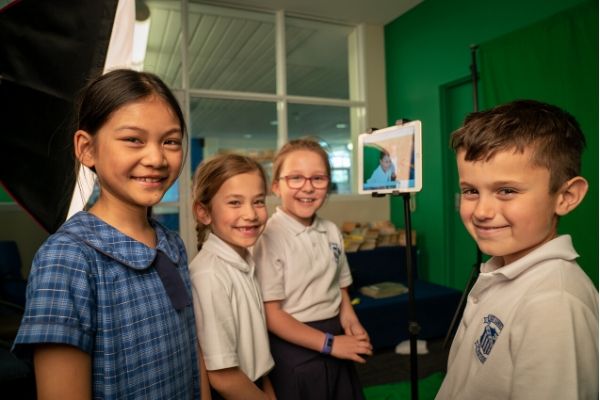Students from five Sydney Catholic schools have gathered to solve real-world STEM problems through the power of collaboration and design thinking.
The second meeting of the ‘Creative Thinkers Collective’ included students from De La Salle College Revesby Heights, Mount St Joseph Milperra, St Christopher’s Catholic Primary School Panania, St Therese Catholic Primary School Padstow and St Luke’s Catholic Primary School Revesby. Teachers said it was an excellent example of Sydney Catholic Schools’ (SCS) new ‘Statement on STEM learning‘ in action, and its benefits to student learning.
Students drawn from the Newman Selective Gifted Education programs or chosen for their interest in the practical aspects of STEM attended an initial day where educators helped them solve the problem of declining bee populations. Their second day asked groups to work together to create a prototype to solve a problem of their choice.
“We call this the ‘inquiry through design process,” said STEM Education Officer Kieran Gibson. “It’s really at the heart of what we believe STEM is all about.
“It gives the kids a chance apply and learn mathematical, scientific and technological skills. The more kids can have a say in it, the more they’re intrinsically motivated to solve the problem and the more they’ll stick with it throughout.”
Children were assisted by both teachers and older De La Salle students as they worked through the design thinking process, and were mentored by Year 10 engineering students and nominated Year 9s.
Solutions developed on the day included a coded computer game to address fear of Maths, a chip to help students locate lost objects, a shredder for food waste, and a machine that encouraged the community to recycle by offering credits for Opal cards.
De La Salle Year 7 student Derick Chan and Year 6 St Luke’s Catholic Primary School Revesby student Matisse Beaton worked together on their project, ‘The Power Plant’, which would provide sustainable energy at a lower cost to consumers.
“We’re using three renewable processes at one time – solar power, wind power and a hydro dam,” said Derick.
“It’s a reproductive system – water goes down and spins turbines to make the water go back up to the top,” added Matisse.
While students enjoyed the chance to think freely and work with new friends, the day also benefited educators, allowing them to see a design-thinking task in action, as run by Sydney Catholic School’s expert new STEM officers.
De La Salle College Gifted Education Facilitator Bernadette Webb was part of a team that planned the event as a way to encourage greater connection between the college and its feeder schools. She said she had been amazed by the support available from the SCS STEM officers.
“In gifted education it’s all about removing the ceiling and seeing what students can come up with,” she said, “we’ve had two full days of critical and creative thinking with over 120 students in one room and it was buzzing, and we all hope students can come out of today able to look at problems with a critical lens and realise that there’s always more than one solution.”
“There are students that are going out into our world as potential leaders, innovators and inventors. Giving them a space to do that now will hopefully inspire some of them to do more of the same in years to come.”

